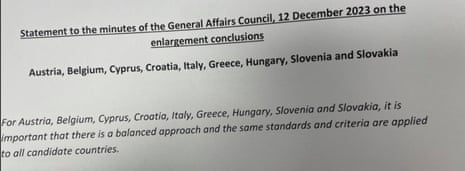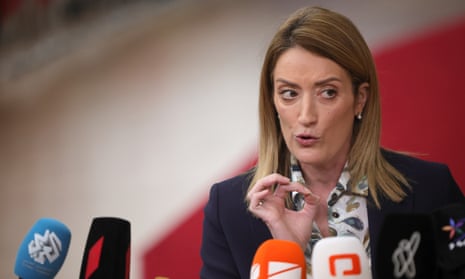‘No reason to negotiate’ Ukraine’s membership, Orbán says
Arriving at the summit, Hungarian prime minister Viktor Orbán told reporters that there have been many talks and the Hungarian position is clear: when it comes to EU membership, the preconditions for Ukraine have not been met, the Council is not in a position to make a decision – and Hungary will not budge.
He added:
The money for Ukraine, in short term, is already in the budget. If we would like to give longer term and bigger money, we have to manage outside the budget, and we support it.
Orbán also said:
Enlargement is not a theoretical issue. Enlargement is a merit-based, legally-detailed process, which has preconditions … there is no reason to negotiate membership of Ukraine now. Even not to negotiate.
The prime minister insisted that Hungary is not linking any of its own issues with Ukraine policy.
Key events

Lisa O’Carroll
Hungary is not the only member state questioning ‘fast-tracking’ Ukraine while leaving countries like Bosnia and Herzegovina behind.
Austria, Belgium, Cyprus, Croatia, Italy, Greece, Hungary, Slovenia and Slovakia have noted in a summit of European affairs ministers earlier this week that “it is important that there is a balanced approach and the same standards and criteria are applied to all candidate countries”.
But as one diplomat said, Ukraine has completed 80% of reforms required for the first step to membership talks, and is expected to complete with 100% expected by spring. Bosnia, the diplomat said, has completed just 20%.
It’s going to be a long summit.

Summit officially begins
The European Council summit has started.
Stay tuned for updates.

Lisa O’Carroll
The German chancellor, Olaf Scholz, who met Viktor Orban ahead of the summit in a bid to smooth progress on the Ukrainian front said he was “abosolutely sure” that the enlargement was “a necessary debate here in Europe”.
“We must make progress in this accession processes we have.
“It is a decision of the European Union that we are ready for enlargement discussing with the Western Balkan states, discussing with Moldova, Ukraine and Georgia,” he said.
Enlargement is ‘win-win’, European parliament president says
Arriving at the gathering, European parliament president Roberta Metsola said “this is a historic summit.”
She said:
Deals are always possible. So on enlargement, very clear, this is a win-win situation. Ukraine should be given the moral, political, financial support that it deserves, and we all need for our own security.
Same with Moldova, same with Georgia and Bosnia Herzegovina.
And we also would like – and I say this in every European Council – a decision on Schengen for Romania and Bulgaria.
On the EU budget, she said:
Funds are finite. We need to be realistic. And therefore I understand the gap is not very big, and I hope that we can really find a solution. Unity is key.


Lisa O’Carroll
Here’s a fuller transcript of what Viktor Orbán told media this morning about his objection to opening negotiations on Ukraine membership of the EU.
On Ukraine membership of the EU, he is not for budging.
“Enlargement is not a theoretical issue. Enlargement is a merit based, legally detailed process, which has preconditions. We have set up seven preconditions and even by the evaluation of the Commission, three out of the seven is not fulfilled. So there is no reason to negotiate membership of Ukraine.
He added in “my estimation” there were even more conditions Ukraine had not met, but “even three is enough to say that if you haven’t fulfilled the preconditions, there is no chance to start to negotiate.”
One the €50bn Ukraine fund, he is clear the EU can either continue with existing funds or find it outside the EU-wide budget – either way that means money from 26, not 27 member states.
“The money [for Ukraine] is already in the budget. So [there is] no extra decision to give it [the money] in the short term in longer term, long term and a bigger sum of money.
“My position is that we should give it outside but we are not under the pressure of the time because the bridging solution is already in the budget,” he added.
‘No exceptions!’ Orbán says
In a new post on social media following his meeting with the French and German leadership, Hungary’s Viktor Orbán said “enlargement is a merit-based process. There are no exceptions!”
He did not, however, explicitly repeat his opposition to opening accession talks.
A number of senior politicians have underscored the historic importance of today’s summit.
Gabrielius Landsbergis, Lithuania’s outspoken foreign minister, said today “Europe makes its most important decisions in recent history.”
Today, as Europe makes its most important decisions in recent history, I can only say this: Я українець. I am a Ukrainian.
— Gabrielius Landsbergis🇱🇹 (@GLandsbergis) December 14, 2023
‘Stakes are too high to have someone play with it,’ Ukraine says
Olha Stefanishyna, Ukraine’s deputy prime minister for European integration, sent a blunt message this morning to EU leaders meeting in Brussels.
The European Council’s “decisions on Ukraine are a piece of a much bigger puzzle,” she said, adding:
The stakes are too high to have someone play with it.
#EUCO‘s decisions on Ukraine are a piece of a much bigger puzzle. The stakes are too high to have someone play with it.
As for us, Ukrainians have always stood for Europe, its values, and security. pic.twitter.com/kqCCs6L0rv
— Olga Stefanishyna (@StefanishynaO) December 14, 2023
The Hungarian government has shared images of Viktor Orbán’s meeting with EU leaders ahead of the summit’s formal opening.

Lisa O’Carroll
The Danish prime minister, Mette Frederiksen, has said it is “no use in such a crucial place as we are right now, that a few can block us, as a continent, from making the right decisions.”
She called for leaders to maintain their united front.
“I think when Putin expected the house of cards to fall. It has not fallen. We are still here, and we will continue to be here.”
Orbán’s position not softening, officials say as Hungarian leader puzzles Brussels
Hungarian prime minister Viktor Orbán’s position opposing the opening of accession talks with Kyiv is “not softening”, said one European official this morning.
A European diplomat agreed, saying they have not detected a shift in the Hungarian leader’s position.
The French president, Emmanuel Macron, and German chancellor, Olaf Scholz – together with the presidents of the European Commission and European Council – made a last-minute effort to bring Orbán onboard.
Arriving at the summit, the Hungarian prime minister insisted that his position is based on procedural reasoning and a commitment to merit-based decisions: Ukraine, he argued, does not meet the criteria to open accession talks.
And in a Facebook post shortly after 11am CET, Orbán said: “To every question the same answer: it is not timely to discuss Ukraine’s EU accession. We don’t support it!”
In government-controlled Hungarian media outlets, headlines echoed an intractable position.
“Shocking corruption, unhealthy genetically modified grain, cruelly persecuted Transcarpathian Hungarians – and more. We show why Ukrainians are totally unfit for Union membership,” wrote the Orbán-linked news portal Origo in its lead story this morning.
But there is still the possibility that the prime minister is leaving himself some room for manoeuvre.
Some of the Hungarian government’s communication this week has emphasised an opposition to “fast” accession for Ukraine – even though quick accession is not on the table and it is widely accepted that the process would take years. One option for the prime minister, therefore, if he chooses to back down, would be to claim that he was victorious because he prevented a quick accession.
There’s another element at play: some officials note that Orbán loves attention – and has been working to make himself a bigger player on the European stage. For him, getting the summit to revolve around the Hungarian government, with big countries’ leaders rushing to meet with him and every press outlet reporting his comments, could be a win itself.
“I wouldn’t discount,” said another European official, “that Orbán wants to look like a global leader.”

Lisa O’Carroll
The Outgoing Dutch prime minister, Mark Rutte, said the timing of the release of €10bn in withheld funds to Hungary on the eve of the EU summit was “unavoidable”.
“They had to make the decision by Friday. I know eyebrows have been raised because of the coincidence in timing, but I think it was unavoidable because it had to be decided before Friday,” he said.

Lisa O’Carroll
The Irish taoiseach, Leo Varadkar, said a positive decision on funding and accession to the EU “mattered” to the soldiers on the frontline in Ukraine.
It might take many years for Ukraine to join the European Union, but we should begin negotiations next year.
And I know from speaking to President Zelenskiy that matters on the frontline. Soldiers who’ve been fighting on the front line for Europe, for Ukraine, this will really count in terms of their morale. So this is a really important meeting.
Borrell calls for focus on political solution in Middle East
Josep Borrell, the EU’s foreign policy chief, said when arriving at the summit that the bloc must continue supporting Ukraine “as much as we can.”
On the situation in the Middle East, he said:
We have to take into account the vote in the United Nations general assembly.
The situation requires certainly a humanitarian stop in the fight in order to free the hostages and avoid a humanitarian catastrophe.
And we have to start thinking about how do we deal with the problem in political approach.
The Arab countries have already said that they will not participate in rebuilding Gaza unless there is a strong commitment from the international community to build a two-state solution. And we have to focus on that. We have to focus on a political solution to the problem once and for all.

